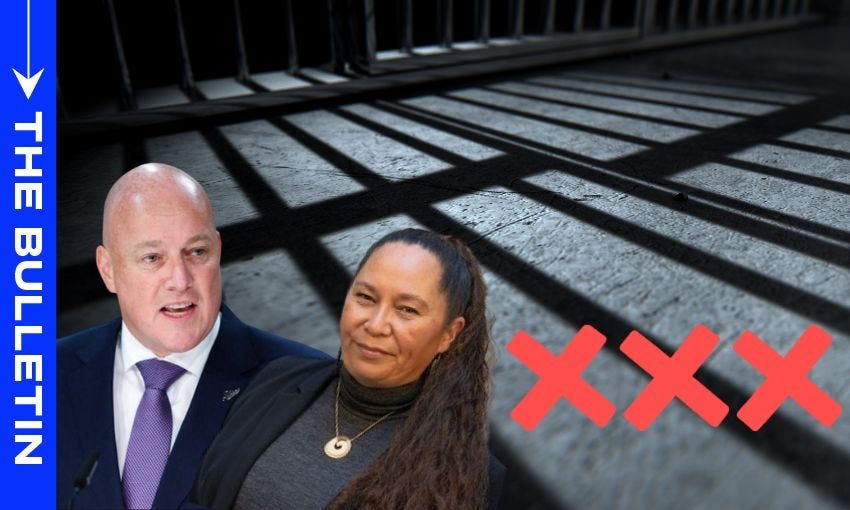Government chalks up 'tough on crime' point with resurrected three strikes law
It's been called a failed experiment and a judicial straightjacket but the government says the revised three strikes law will be a more workable regime
Mōrena, and welcome to The Bulletin for Tuesday, April 23.
In today’s edition: Foreign minister says recognising Palestinian state ‘a matter of when not if’ but also not now; Auditor-General calls for strengthening of mechanism to manage ministerial conflicts of interest on fast track consenting; judge reserves decision on Waitangi Tribunal summons for minister; but first, the second coming of the three strikes law

Three strikes, round two
Just as Taylor Swift has kept fans happy by rereleasing all her albums, complete with bonus tracks, the government has moved again to shore up its perception as tough on crime by reintroducing the three strikes law, with a few revisions. The well-signalled reintroduction, which has yet to be brought to the House as a bill, was announced yesterday by associate justice minister Nicole McKee alongside prime minister Christopher Luxon. The law was first introduced by National in 2010 and repealed by the last Labour government in 2022. As Anna Murray explains for 1News, the law will cover the same 40 serious offences as last time, with the addition of new strangulation and suffocation offences. This time around, it will only apply to prison sentences longer than two years, the use of the “manifestly unjust” exception will be extended, and will offer a limited benefit for guilty pleas.
‘A more workable regime’
In response to questions about why it will be different this time around, McKee said, “We are making changes to create a more workable regime and also to address issues that arose under the previous law, such as capturing minor offending.” The law has been subject to plenty of criticism and scrutiny over the years. Following Labour’s failure to repeal the law in 2018 (handbraked by NZ First), associate professor of criminology James Oleson wrote that “Straitjacketing judges with presumptive sentences will not work.” The most egregious example of the ramifications of prescriptive sentencing arrived in 2022 when Daniel Fitzgerald was awarded $450,000 in compensation after being sentenced to seven years in prison for indecent assault after kissing a woman on a Wellington street. Fitzgerald had serious mental health issues but had two prior convictions for indecent assault.
Little evidence the law acts as a deterrent
The Herald’s Derek Cheng did a deep dive on the law last year (paywalled). The law is premised on two ideas. One, that it will act as a deterrent, and two, that it will improve public safety by keeping serious offenders in prison. As Jack Tame notes, Ministry of Justice research says there’s no evidence in New Zealand to suggest the law makes repeat offenders think twice. Cheng returns to the subject this morning (paywalled), writing, “There’s a reason Christopher Luxon can’t point to evidence. It doesn’t exist.” Based on yesterday’s language, I’d argue that the weighting is firmly in favour of public safety as its strongest and most publicly saleable rationale. When asked about whether the law disproportionately impacts Māori and Pasifika, Luxon said, “Let's be really clear here, our goal here is to incarcerate violent offenders, violent sexual offenders. I don't care whether they're Māori, or non-Māori. They're coming off our streets because they cause pain and suffering to regular New Zealanders. That is what it's all about here. That's as simple as it gets.”
California dreaming
In 2022, the University of Auckland’s Carrie Leonetti called the law here a failed experiment. Leonetti is a former criminal defence lawyer from California. Both Luxon and McKee pointed to California as an example of the law in practice and the decline of violent crime in the US state. In March this year, the editorial board of the LA Times, who have long maintained an oppositional stance to the state’s law, published an editorial calling its legacy there “30 years of wasted spending and ruined lives.”
According to FBI data crunched by the Public Policy Institute of California, crime rates in the state broadly track along the same lines as the rest of the US, which have been declining. As this NBC article points out, the declining trend in the US hasn’t changed the perception that crime is rising. I explored perception versus reality last month. In New Zealand, concern about crime and law and order has declined, while Ministry of Justice data suggests “overall there is a continuing upward trend in sexual and violent crime data – including family violence.” As Bulletin readers will know, there’s a fair bit of caution exercised by experts and journalists in citing crime stats, so at the very least, it’s probably best not to isolate Californian crime stats from national trends in looking at causal relationships between them and the efficacy of the three strikes law.
Right now, we need your support more than ever
The Spinoff recently estimated that the number of full-time journalists in New Zealand may have halved since 2018 Census data was published. As the media landscape continues to change, numbers continue to decrease. The Spinoff is not immune to the drastic advertising slowdown impacting the sector. That’s why we’re immensely grateful to our audience for their support. To those who already support us, thank you. If you don’t and are able, we’d be very grateful if you’d consider becoming a Spinoff member or donating today.
Duncan Greive
Founder
Auditor-General raises flag on fast track consenting bill
The auditor-general, John Ryan, and the parliamentary commissioner for the environment, Simon Upton, have urged the select committee reviewing the fast-track consenting legislation to consider changes. In his report, Ryan has encouraged the committee to consider whether the transparency and accountability arrangements in the bill are proportionate to the discretion being provided to ministers. He warns real or perceived conflicts of interest create public concern about the integrity of decision making. The bill gives three ministers, Chris Bishop, Simeon Brown, and Shane Jones, extraordinary power to green-light infrastructure projects. Upton’s report recommends scrapping the role of ministers as decision-makers and calls for environmental considerations to be elevated.
Ryan has previously criticised the last government’s $15b infrastructure spend-up during the pandemic, saying the previous government should have ensured better transparency and value for money.
University of Otago law professors Andrew Geddis and Nicola Wheen have labelled the bill’s processes and potential effects as “extremely concerning.”
Recognising Palestinian state a matter of ‘when not if’ but not for now — Peters
Following a request from the Labour Party for the New Zealand government to recognise Palestine as a state, foreign minister Winston Peters has said any change to our current settings would need to credibly assist diplomatic efforts to achieve a two-state solution. As Peters notes, the government supports the establishment of a Palestinian state and has done so for decades. Peters said the “immediate and urgent need is for an immediate ceasefire and the provision of aid to help alleviate the desperate plight of an innocent civilian population”. “Bluntly asserting statehood unilaterally at this point, however well intentioned, would do nothing to alleviate the current plight of the Palestinian people. Indeed, it might impede progress,” he wrote.
In a speech two weeks ago, Australia’s foreign affairs minister, Penny Wong, said that recognition of a Palestinian state is “the only hope to break the endless cycle of violence” in the Middle East and a two-state solution would help ensure long-term security for Israel and further undermine Hamas. The United States used its veto at the United Nations last Friday to block a well-supported resolution that would have paved the way for full membership of the UN for Palestine. 139 of the 193 UN member states currently recognise the State of Palestine.
Click and Collect
Judge reserves decision on Waitangi Tribunal summons for minister for children Karen Chhour
Carwyn Jones explains why the Waitangi Tribunal summonsed the minister and why the Crown fought it.
Health NZ denies it's ordered a hiring freeze; junior doctors reject latest pay offer and have issued a strike notice
New research from the University of Otago into a programme helping unhoused people into homes shows big improvements in health, justice, income and employment outcomes.
Wāhine Māori art collective, Mataaho, wins Golden Lion at Venice Biennale
Air NZ’s domestic airfares have gone up as of today, but everyone on the airline’s short-haul international flights can now have a little snack.
Feeling clever? Click here to play 1Q, Aotearoa’s newest, shortest daily quiz.
Shanti Mathias investigates why local climate activists known for glueing themselves to roads have set their sights on the cruise ship industry. Alice Neville explains how the government gets its gang member numbers and why there's so much uncertainty in the process. Alex Casey reminisces about Popstars and TrueBliss changing reality TV forever. A bunch of people share their thoughts on Taylor Swift’s new album(s). Max Rashbrooke argues that the government risks its own goal in cutting funding for the Growing Up in New Zealand study. We round up all the new TV and movies on streaming services this week.
Sporting snippets
Five new players contracted to Black Ferns
Scott Dixon dedicates Indycar win to Sir Colin Giltrap
New Zealand swimmer Lewis Clareburt says he feels let down by the World Anti-Doping Agency, after nearly two dozen Chinese swimmers who returned positive doping went unpunished.
The Bulletin is looking for a sponsor
Expertly curated, The Bulletin delivers essential news and diverse perspectives from Aotearoa and beyond to business leaders, politicians, and decision-makers nationwide. Contact commercial@thespinoff.co.nz to learn more.
Got some feedback about The Bulletin, or anything in the news? Get in touch with me at thebulletin@thespinoff.co.nz.
If you liked what you read today, share The Bulletin with friends, family and colleagues.











More nothing. Something like a swing. It’s all go to nowhere.